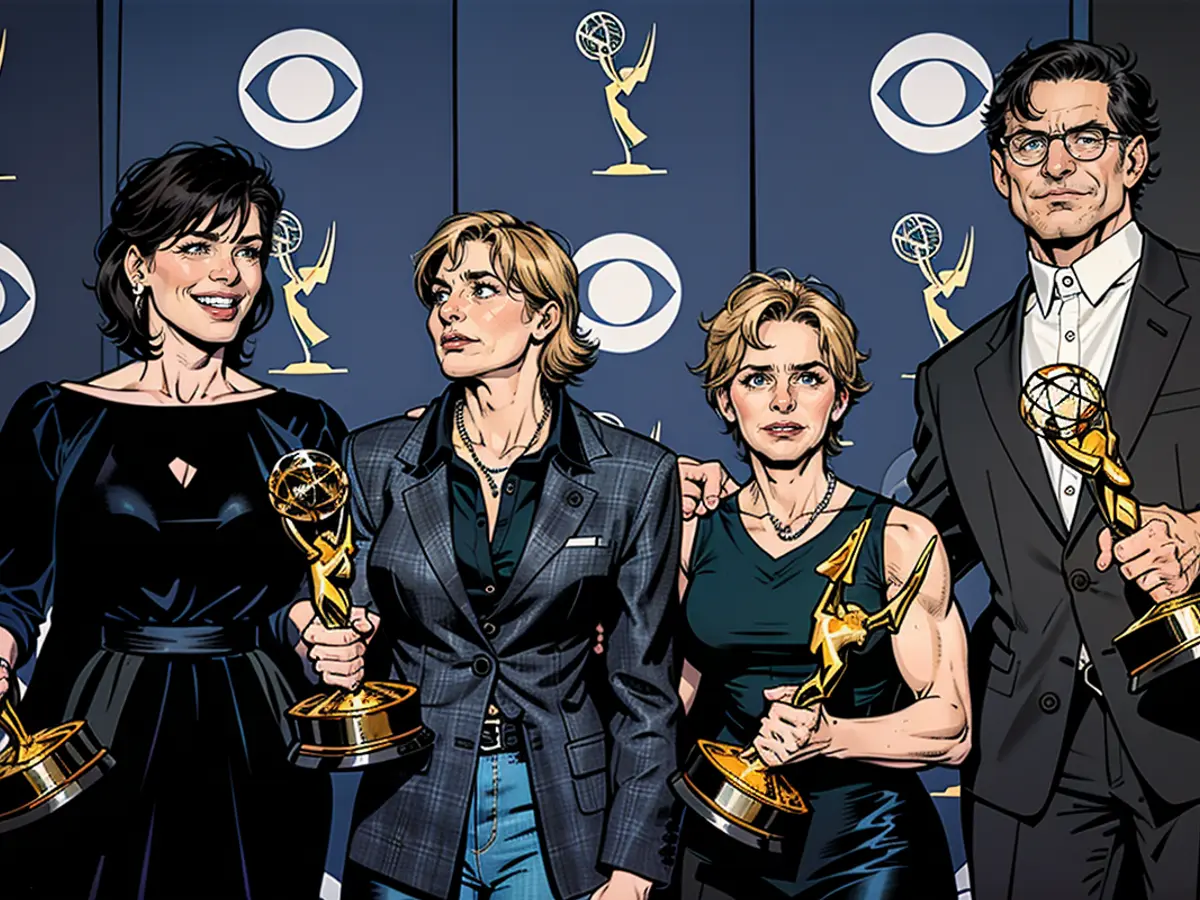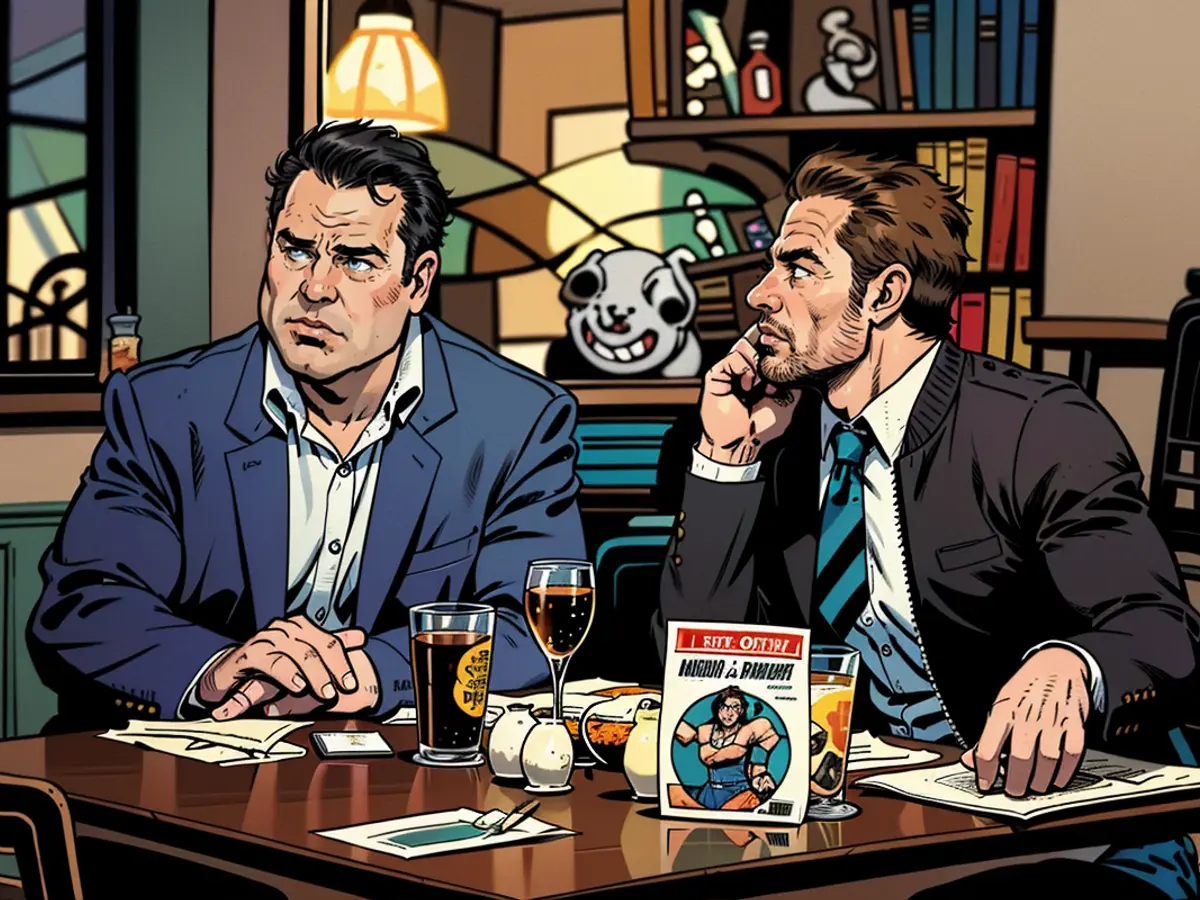Almost three decades ago, Ellen publicly identified as gay, significantly altering the landscape of television.
Excitement skyrocketed as the broadcast date drew near. An unrevealed draft of the show appeared online ahead of time. The comedian hinted at the unveiling in media appearances. Ellen herself graced the Time magazine cover a few weeks before the show aired. So when it was about time for "The Dog Episode" to air, viewers could barely contain their patience any longer, eagerly waiting to hear Ellen Morgan utter those two life-changing words.
And they were still in for a surprise. At the beginning of the episode, Ellen's friends grew restless, urging her to emerge from the bathroom.
"Ellen, are you coming out or what?"
"Quit teasing us and come on out already!"
Ellen peeked her head out from behind a door, exasperated by her friends' impatience.
"What's the fuss, I've still got an hour!" she laughed.
The episode was filled with quippy humor, a full hour-long affair, brimming with allusions to Ellen's sexual identity. Prior to "The Dog Episode," her character had rarely indulged in romance and typically avoided attempts at courtship, bucking conventional sitcom tropes and irking network executives. The episode reportedly took its name from a comment made by Disney CEO Michael Eisner, suggesting that if Ellen wouldn't date men, perhaps she could at least adopt a dog as a compromise.
Ellen Morgan never did end up with that dog, but the episode left an indelible mark in television history. Ellen became one of the first openly gay lead characters on TV, and the influence of "The Dog Episode" has been extensively analyzed in numerous academic articles since its debut. Its impact has inspired future successful sitcoms, such as "Will & Grace" and "Modern Family," which feature gay leads.
Dava Savel, co-showrunner of "Ellen's" fourth season, has written numerous television episodes throughout her career and is still searching for the "magic" she witnessed in "The Dog Episode."
"I believe the episode truly struck a very sensitive nerve in the country," she told CNN. "That's why it was successful — because it was real."
The Making of "The Dog Episode"
The making of "The Dog Episode" began with Ellen herself.
She invited the writers to dinner before the fourth season commenced and declared that she wanted her character, Ellen Morgan, to come out as gay (though her colleagues at the time were already aware of her sexuality).
"It all started with her, wanting to be true to herself," Savel said. "Imagine not being able to be yourself — 'my character's this way, but I'm this way.' Oftentimes, the characters merge into the person who plays them and vice versa."
After obtaining approval from Disney TV executive Dean Valentine, Savel and her co-writers embarked on an adventure, interviewing gay writers and cast members from "Ellen" about their own coming-out stories. It was a risky venture, but the writers were eager to explore this new direction for Ellen's character, leading her towards self-acceptance.
"This was an established character on a prominent show — one of the biggest shows at the time — and either it was going to work, or it was going to fail," Savel said.
The writers requested certain conditions from ABC: The episode had to last an hour, and it must air during "sweeps week," the week when networks determine advertising rates based on viewership, as episodes aired during this period often received increased ratings. Ellen's coming-out couldn't appear as a gratuitous publicity stunt, Savel added.
Throughout the season, breadcrumbs were strategically placed, leading Ellen towards acknowledging her sexuality. The show sprinkled hints of gayness from the first episode, including a reference to a character saying the word "gay" that caused a microwave or doorbell to beep, Savel explained. In one scene, Ellen sang "I Feel Pretty" from "West Side Story," halting just short of the "gay" lyric. And throughout the season, Ellen sought answers about her insecurities and unhappiness from a series of therapists, though she continued coming up empty-handed.
It wasn't until Ellen met Susan, an out lesbian character portrayed by guest star Laura Dern, that she felt comfortable acknowledging her sexuality. They had an immediate connection, and it allowed Ellen to finally open up. After admitting to her latest therapist (played by Oprah Winfrey) that she had feelings for Susan, Ellen rushed to the airport to see her once more, now feeling free to express her feelings.
"I can't even say the word," Ellen sighs in the episode's climactic moment, clearly struggling with self-acceptance. "Why can't I say the word? ... What is wrong, why do I have to be so ashamed? I'm 35 years old. I'm so afraid to tell people."
And then, unexpectedly, the microphone captures her confession: "Susan, I'm gay."

Audience Reaction to "The Dog Episode"
Over 42 million people tuned in to watch the episode live, a substantial increase in viewership compared to the rest of the season.
The episode received its fair share of criticisms, including letters and threats, Savel admitted, and an ABC affiliate in Alabama opted not to air the episode at all. However, the backlash was quickly overshadowed by the overwhelmingly positive reactions from viewers who praised the episode for giving them the courage to come out themselves.
Savel witnessed the aftermath firsthand. Following her Emmy victory for co-writing "The Puppy Episode" in 1997, she and her fellow writers, along with DeGeneres, made their way through the crowded backstage area towards the press. However, they were halted by lines of caterers and servers, who paused their work to applaud and congratulate the "Ellen" crew. This moment still brings tears to Savel's eyes, she shared.
"We were soaring," Savel stated. "Those moments of truth – that's what it was all about."
Rachel Loewen Walker, a women's and gender studies professor at the University of Saskatchewan in Canada, continues to show "The Puppy Episode" to her students, many of whom were unaware that DeGeneres starred in a sitcom.
"(The episode) was such a pivotal moment in queer representation on screen, especially given its context: The beloved Ellen DeGeneres was actually gay," Loewen Walker told CNN. "Her coming out made it more than just an on-screen story. It made it real, in a way that sitcoms often aren't allowed to engage with the everyday."
'Ellen' discontinued after the character's coming out
Savel and the other writers were let go after the fourth season, she claimed, as "Ellen" transitioned into a new stage. The fifth season saw a confident Ellen dating, finding a serious girlfriend, and embracing her life as an openly gay woman. (Despite DeGeneres' objections, ABC added parental advisories to episodes featuring gay content throughout the season.)
The "new" Ellen was a stark contrast to the self-deprecating protagonist who previously avoided romance. Ratings for the new season plummeted, and "Ellen" was ultimately canceled in 1998. (While ABC never admitted it, Loewen Walker and other experts speculate that the show was "too gay" for the network at the time.)
DeGeneres returned to TV in 2001 with another gay character in "The Ellen Show," before launching her successful daytime talk show in 2003.
"Looking back on 'Ellen,' I feel that (DeGeneres) shouldered such a significant burden for so many future queer characters," Loewen Walker stated. "It feels as though that absence allowed many others to have presence."
'Ellen' redefined TV, but representation still has a ways to go
"The Puppy Episode" achieved something uncommon in TV: it took a beloved character, developed over several seasons, and completely overhauled her fictional life. Ellen Morgan evolved from the bumbling, charming "girl next door," as the character was often described by network executives, into a self-assured, charismatic gay woman who made no apologies.
The influence of "Ellen" was evident even a year later. When "Will & Grace" debuted a year after "The Puppy Episode," its protagonist and his flamboyant friend didn't need to come out like Ellen did – they were introduced as gay in the pilot. Over a decade later, the "Modern Family" couple Mitchell and Cameron, along with their adopted daughter, Lily, became beloved characters. Now, series centered around young queer characters, like the popular Netflix series "Heartstopper," are commonplace.
Lesbian representation in TV, however, has struggled to keep pace, Loewen Walker pointed out. Characters like Arizona Robbins on "Grey's Anatomy" and many of the women on "Orange Is the New Black" were openly lesbian from the start, and shows like "The L Word" featured a mainly lesbian cast. But these characters frequently faced violence, tragedy, or criticism for reinforcing stereotypes or misconceptions about lesbians.
"It's still rare to see lesbians in that primetime, cable television sitcom role," Loewen Walker said. "Modern Family brought two gay men into our homes, but I can't think of a lesbian or queer woman who has received the same family-friendly welcome."
DeGeneres, despite her reputation as a beloved talk show host, eventually faced allegations of running a toxic workplace. She addressed this in her recent Netflix stand-up special, which she said would be her last.
Savel has not worked with her since 1997, though she recalled DeGeneres as a demanding, results-driven boss with a proven track record. But "The Puppy Episode" remains an integral part of DeGeneres' legacy.
"She is forever enshrined in this episode as a champion of the oppressed gay community – people in the closet," Savel said. "No matter what else she achieves, she has an entire nation that remembers when this happened."

In light of Ellen Morgan's groundbreaking coming out in "The Dog Episode," viewers were eager to see how her character would navigate romance and relationships in the following seasons.
Despite the positive reception towards "The Dog Episode," network executives and critics were hesitant to embrace the more confident, openly gay Ellen in subsequent seasons, leading to decreased viewership and ultimately, the cancellation of the show.







